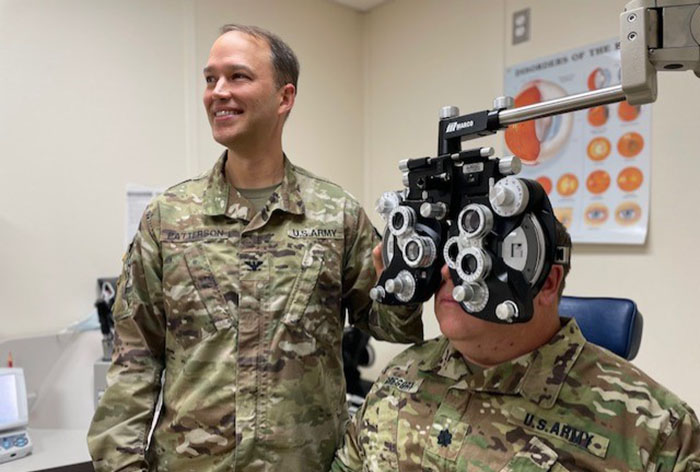Veterans Affairs
Students
Athletics
How Patterson Brought His Future Into Focus

Tony Patterson, Class of ’98, turned down a full-ride academic scholarship to the University of Wyoming to play football at Black Hills State University after a high school friend, Ryan Williams, encouraged him to take a look at BHSU.
“I liked the smaller size. It gave you more of that one-on-one kind of teaching and not just a number in a crowd. The teachers and staff know you a little bit better and you're able to really get involved in organizations. The city has great support for the university. And, of course, the Black Hills are also something that I enjoyed, just where BHSU is located. You can't get much better than having the canyon right there, and the stream running through the town.”
After watching first-hand the impact that glasses made for his foster cousin, Tony had his first thought that he might want to pursue optometry as a career. He decided to pursue a biology degree with a chemistry minor while playing as a wide receiver for the Yellow Jackets. Although Tony knew he wanted to pursue a career in healthcare, he didn’t settle on optometry until he started looking at different schools and their programs. BHSU Professor Charlie Lamb helped lead him to opportunities to get accepted into professional school after graduation.
After his first year at the Southern College of Optometry in Memphis, Tenn., Tony says that his brother joining the U.S. Army provided him with a way to help pay for the remainder of his professional schooling.
“Josh, my brother, mentioned to the recruiter that I was going to medical school, and the recruiter said there was a health professions scholarship program. So I was accepted for that and joined the Army Reserves during my last three years in professional school.”
As a part of the program, Tony was commissioned into the active-duty Army in 2003, going to Officer Basic Camp at Fort Sam Houston in San Antonio, Texas. He was then given his first assignment in Fort Bragg, N.C., and soon after deployed to Iraq just west of Fallujah for four months, handling a lot of eye injuries and infections but also providing glasses prescriptions for active-duty soldiers that were stationed in the area and even seeing some of the locals who needed eye care. “I had never flown in a helicopter before, but after this tour, I had done it more times than I can count.”
Once back in the U.S., Tony was sent to Louisiana right after Hurricane Katrina to support the cleanup efforts, again taking care of eye injuries and providing eye care services for the soldiers that were working down there.
In 2006 he was once again deployed to Iraq with the 82nd Airborne Division. That time, he spent 15 months stationed in the Baghdad Green Zone, a heavily fortified area in the center of Baghdad. During this deployment, Tony met his wife who was a nurse with the 28th Combat Support Hospital (CSH).
“The 28th CSH needed an optometrist, so I was attached to their unit for 13 months. My soon-to-be wife worked in the ER as a nurse, and I had to keep going there for emergencies and we ended up meeting. We got married in fall 2008 when I went to Fort Lewis where she was stationed.”
Tony and his wife, Abigayle, also spent three years in Vicenza, Italy, before Tony was selected to do a newly created two-year combined master’s program in Health Administration and Ocular Disease Residency in San Antonio. He then became Chief of the Eye Service at Ft Campbell, Ky., before being selected as the Director of the prestigious Walter Reed Eye Institute in January 2020. In February of 2021, he received another recognition – a promotion to Colonel.
“It’s been a long haul. You know it’s one of those ranks that’s very tough to get, so I’m excited about it. I’m currently in charge of about 70 people in the clinic overseeing the optometry, ophthalmology, and laser vision center at Walter Reed.”
At the Center, Tony says they see not only active-duty members in all branches of the military, they also handle the cases of family members and retirees and have a Traumatic Brain Injury Residency Program, and teach as many as eight optometry interns from around the U.S. at any given time.
Although it wasn’t his original plan, Tony has lived in 6 different states and countries in his 18 successful years in the U.S. Army. When he decides to retire, Tony and his wife and three kids, Hannah, Benjamin, and Catherine, are looking forward to finding their “forever home.” For now, he’s taking all the lessons learned at BHSU in the classroom, on the football field, and in student organizations to benefit patients and teach the next generation of optometrists.
